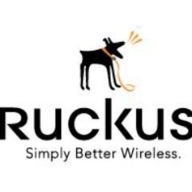

Huawei Wireless and Ruckus Wireless are prominent competitors in the wireless solutions category. Huawei seems to have the upper hand in terms of affordability and user-friendly setup, while Ruckus is preferred for its advanced connectivity and enterprise-level performance.
Features: Huawei Wireless is notable for its cost-effectiveness, ease of setup, and user-friendly management, incorporating Wi-Fi 6 technology. It is highly scalable and offers robust technical support. Ruckus Wireless excels with its BeamFlex technology, which enhances signal strength and mobility, and its adaptive antennas that ensure strong connectivity and ease of management.
Room for Improvement: Huawei Wireless could enhance support for small to medium businesses, improve network access control, and offer better third-party integration. Ruckus Wireless should address its high pricing, improve cloud solution user-friendliness, and offer better license management.
Ease of Deployment and Customer Service: Huawei Wireless is praised for its straightforward on-premises deployment and strong customer support, though it faces challenges in response time and local support availability. Ruckus Wireless offers flexible deployment options, including hybrid and cloud-based, but user feedback indicates a need for quicker support response times.
Pricing and ROI: Huawei Wireless is known for its competitive pricing, often lower than competitors like Cisco and Aruba, providing a solid ROI. Ruckus Wireless, while more expensive, justifies its pricing with superior performance and innovative features that reduce deployment costs through fewer required access points.
| Product | Market Share (%) |
|---|---|
| Ruckus Wireless | 12.4% |
| Huawei Wireless | 5.6% |
| Other | 82.0% |



| Company Size | Count |
|---|---|
| Small Business | 17 |
| Midsize Enterprise | 8 |
| Large Enterprise | 12 |
| Company Size | Count |
|---|---|
| Small Business | 69 |
| Midsize Enterprise | 21 |
| Large Enterprise | 26 |
Ruckus Wireless is part of Ruckus Networks/Commscope and provides reliable wireless network solutions and services to large venues, schools, hotels, hospitals, malls, and public spaces (and more) worldwide.
Wireless access is an integral necessary part of today’s modern, fast-paced lifestyle. It is essential that dependable, safe wireless capabilities be available in most of today’s largely populated public spaces. Ruckus Wireless is the trusted industry leader in assisting organizations of all sizes to provide wireless access throughout their locations, both inside their physical structures and adjacent open outdoor areas.
Ruckus Wireless empowers users to design and create a wireless network across their organizational space to ensure that wireless coverage is available consistently to anyone who needs it. Ruckus can handle anything from homes and small to medium-sized businesses to hospitals, college campuses, airports, malls, stadiums and more. Ruckus also has excellent options for outdoor wireless networks. Many users choose Ruckus Wireless for broad extensive outdoor use. The solution offers excellent durable outdoor access points and a very robust, super fast, reliable Wi-Fi. Each and every access point is very powerful, and the outdoor access points can be very easily disguised to keep the network secure.
Another strong point is that Ruckus technology is based on frequencies. If there is ever any type of wireless interference, Ruckus Wireless can change frequency automatically so there are never any interruptions. Users also have the option to block outside access points and signals that may interfere with their network and make their network the only one that people can see within the network. Users can additionally whitelist certain networks if desired.
Ruckus uses the latest next-gen Wi-Fi, Wi-Fi 6, ensuring that more devices can be handled with greater speed and continuity. With Ruckus, users have great control over network traffic. They can also allocate the amount of bandwidth network users are granted based on their status - eg., guest, corporate, etc. - and give users priority on the network based on their status. Ruckus also has mesh and beamforming capabilities, which are recognized as a valued feature for many users.
Ruckus Wireless is robust, extremely reliable, very easy to deploy, and offers amazing coverage and rock solid connectivity. It is very easy to add additional access points across the network. Ruckus Wireless is very easy to use and manage using an app on any mobile device.
Reviews from Real Users
A Director Engineering & New Business at a comms service provider says Ruckus “provides superior coverage and is very dependable”
Sintayehu A., Director Of Information Communication Technology at Dire Dawa University, relates that "Ruckus Wireless supports the most recent technologies. We can trace every individual and what kind of traffic they're using on our campus. It is very helpful."
Philip S., Independent Consultant - Wireless, says, "The solution is very stable. I've worked with it at a hospital before, where we deployed it all over the hospital. It worked everywhere and continuously worked flawlessly."
We monitor all Wireless LAN reviews to prevent fraudulent reviews and keep review quality high. We do not post reviews by company employees or direct competitors. We validate each review for authenticity via cross-reference with LinkedIn, and personal follow-up with the reviewer when necessary.